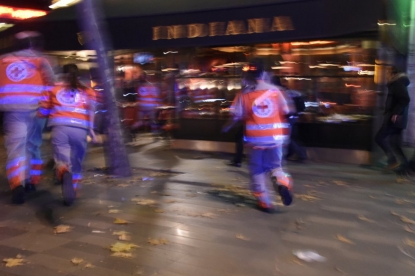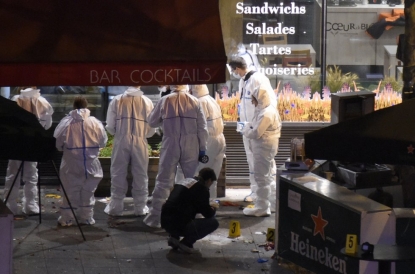'War' in Paris
Paris, November 15, 2015 -- It all begins with a phone call this Friday, when I am the on-duty photographer for AFP in Paris. My editor tells me that shots had been in Paris’s 10th arrondissement. That’s all I know as I head out. It could be an attack, it could be a one-off, it could be a criminal settling of scores.
My colleague Kenzo Tribouillard and I are among the first photographers to get to the scene. Confusion and panic reigns all around the Place de la Republique. People are running in all directions, but we don't yet know why. People are talking about a shooting spree, but I don't hear any shots. All around you can feel blind fear and panic of the unknown.
 People lie on the pavement outside a cafe. (AFP / Anthony Dorfmann)
People lie on the pavement outside a cafe. (AFP / Anthony Dorfmann)All of the sudden I am pushed by the police along with a group of passersby into a restaurant. I have no desire to be there, I want to be on the street, continuing to do my job, but I have no choice. The police have received orders to get everyone out of danger and they don't want to hear anything from me.
I spend a good half hour stuck in the basement of this restaurant before I manage to finally negotiate my liberty. The police are extremely tense and try to dissuade me from leaving, but finally let me go.
Back on the street, I take some photos of the Republique and the surroundings, to illustrate the panic that's reigning there. Both rescuers and passersby are running in all directions.
 Rescue workers arrive on the scene. (AFP / Dominique Faget)
Rescue workers arrive on the scene. (AFP / Dominique Faget)In the meantime I’ve gotten some more information on what’s happening in Paris that night. I learn that there is a deadly hostage-taking underway at the Bataclan concert hall, not far from where I am.
A police line is blocking access to the scene, but I manage to talk my way inside.
I choose a place near the theater where I can see nearly everything and I decide to stay there -- if I move, I risk either missing something or being thrown out of the area. So I stay there for the next five or six hours, taking pictures of those who manage to escape.
 Medics help a woman outside the Bataclan concert hall. (AFP / Dominique Faget)
Medics help a woman outside the Bataclan concert hall. (AFP / Dominique Faget)Over the past few days I’ve heard a lot of people speak of “scenes of war,” of “a situation of war,” of “war medicine.” But you have to put things in perspective. On Friday, November 13, we witnessed a series of terrorist attacks in Paris, blind massacres, the worst attacks the French capital has seen since the liberation in World War II. But this is not a war.
 Journalists take cover near the Bataclan concert hall. (AFP / Dominique Faget)
Journalists take cover near the Bataclan concert hall. (AFP / Dominique Faget)War -- like what I covered in Lebanon, in Chad and more recently in eastern Ukraine -- is to live in daily fear of death, to live on borrowed time, to not have security anywhere, anytime. It’s to watch people falling around you every day, from bullets or shells that rain down on entire cities. It’s to have dead bodies lying on the street, because people are too scared to go outside to take them away.
War is when -- at any moment -- you risk finding yourself at the mercy of an isolated shooter or lunatic, those who run around without restraint in most of the world’s conflict zones.
War is when you can’t count on the police to ensure security, when you see thousands of refugees on the roads. ‘War medicine’ is when you have to amputate in a hurry an extremity that in normal circumstances would have been saved.
 Forensic experts inspect the site of the attacks. (AFP / Franck Fife)
Forensic experts inspect the site of the attacks. (AFP / Franck Fife)In a sense of course, it is a war. France is in a war against terrorism. The Islamic State group has declared war on us. It’s a war in the political sense of the term, and in the heat of the moment, lots of people can be tempted to use this word to describe the situation in Paris on November 13.
But in Paris, contrary to a real war, the police and rescue services can do their work, establish security perimeters, protect passersby, treat the wounded, evacuate the dead so that they’re not abandoned in the street for days.

A rose with a sign reading "in the name of what?" is stuck in a bullet hole of a restaurant that was hit by the attackers. (AFP/Loic Venance)
Even in the heat of the night on November 13, most of the bistros and restaurants were open and in the rest of the city the situation was totally normal. Two days after the drama, life is returning to normal.
We photographers often witness scenes that are very emotional, very hard. But once the attacks have happened, there is no more danger.
In a war, it’s totally different. In a war, you’re wearing bulletproof vests, helmets, and are constantly afraid that you will be targeted.
So as tragic as the Paris attacks may have been, I don’t like to speak of war. War would be if such bloodbaths would occur every day for weeks. No doubt those who have caused this tragedy wish just that. But luckily that’s not the case.
Dominique Faget is an AFP photographer based in Paris.


